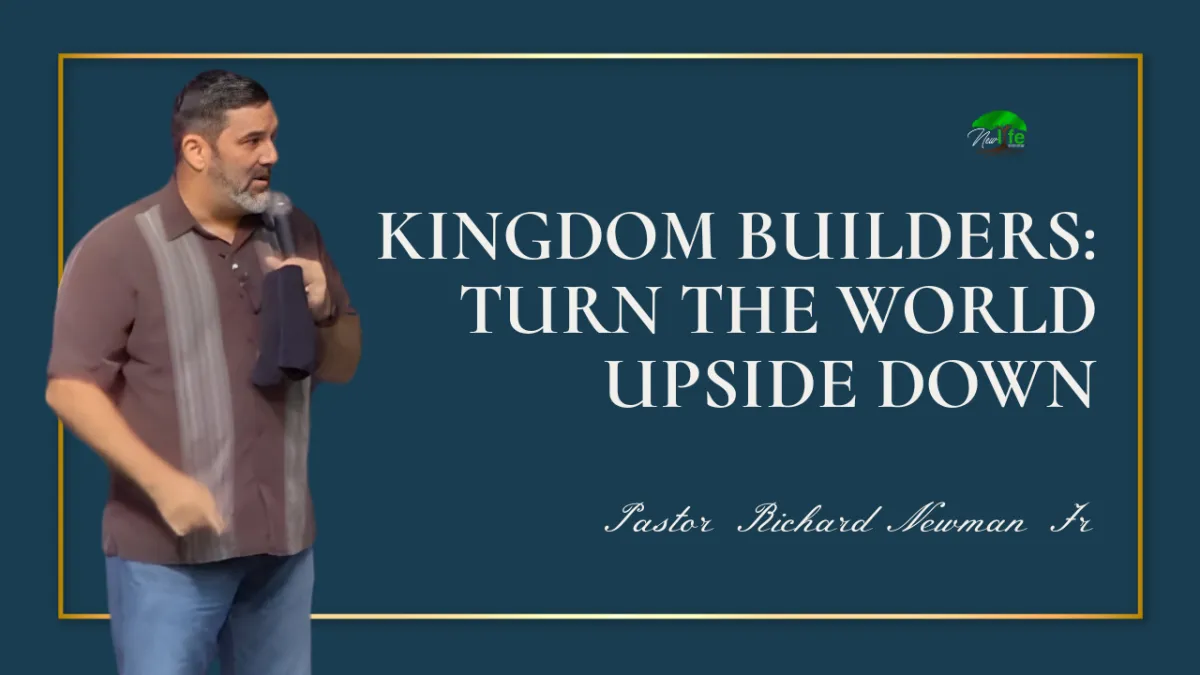
Who Are We
Building the Kingdom: Who We Are as Christians
In a world that often pulls us in many directions, understanding our identity and purpose as Christians is crucial. This message explores what it means to be "kingdom builders" and how we can fulfill our calling to transform the world around us.
What Does It Mean to Be Kingdom Builders?
The early Christians were described in Acts 17:6 as "these men who have turned the world upside down." This wasn't a casual observation—it was a recognition of their impact. These believers had such influence that they were seen as disruptive to the established order.
What gave them this power? Acts 2 shows us that they were filled with the Holy Spirit at Pentecost, enabling them to speak in languages they didn't know and reach people from all nations. Before this, in Acts 1:8, Jesus had promised them: "You will receive power when the Holy Spirit comes upon you, and you will be my witnesses in Jerusalem, in all Judea and Samaria, and to the ends of the earth."
The transformation from fearful disciples to world-changers happened because they received power from above and followed Jesus' command to go.
Are We Following Christ's Commands or Suggestions?
In John 15:12, Jesus says, "This is my commandment, that you love one another as I have loved you." He continues in verse 14: "You are my friends if you do what I command you."
These aren't suggestions—they're commands. Just like the Old Testament commandments ("Thou shalt not kill," "Thou shalt not steal"), Jesus gives us clear directives. He commands us to love one another and to go and bear fruit.
Matthew 28:19-20 reinforces this: "Go therefore and make disciples of all nations, baptizing them in the name of the Father and of the Son and of the Holy Spirit, teaching them to observe all that I have commanded you."
The question is: Are we obeying these commands? Or have we reduced them to optional suggestions?
What Does It Mean to Make Disciples?
Many Christians feel inadequate when it comes to discipleship. "I don't know how," they say. But discipleship is simply sharing what you've learned with others.
Think about it this way: If you figure out how to assemble a difficult piece of furniture and then watch someone else struggle with the same task, wouldn't you help them? That's the basics of discipleship—sharing what you've learned from God's Word with others who need that knowledge.
There are two forms of discipleship:
Academic discipleship (formal teaching)
Conversational discipleship (sharing what you've learned in everyday conversations)
Even if you've only been in church for a short time, you've heard hours of scriptural teaching. You have something to share with others who are struggling.
Why Aren't We Seeing the Same Impact as the Early Church?
The early church planted congregations with minimal training. Paul would sometimes spend only a month or two in a location before appointing leaders and moving on. Why were they so effective?
The difference was their focus. They were kingdom-minded rather than self-focused. Today, we often prioritize our own needs:
"I'm not getting fed at that church"
"I don't have time to learn something to help somebody else"
"I'm going through too many things myself"
This self-focus prevents us from fulfilling our purpose. We're so concerned about our own comfort that we push away the very people who need the life-giving message of Jesus.
How Can We Become Kingdom Builders?
To become effective kingdom builders, we need to:
Change our mindset: Focus on building God's kingdom rather than our own comfort
Tithe our time: Dedicate a portion of our time to serving others
Be willing to disciple others: Share what we've learned with those who need guidance
Love everyone: Minister to all people, regardless of their past sins or current struggles
Jesus talked about the kingdom 146 times in the Gospels. The kingdom is at hand—it's now. When we focus on the Father's work and His commandments to reach lost people, we build His kingdom.
What About the Difficult Cases?
One of the challenges of kingdom building is ministering to people with difficult pasts. How do we minister to:
Former drug addicts
Those who have stolen
People with violent pasts
Those with sexual offenses in their history
If we truly believe the blood of Jesus is sufficient, we must believe it's sufficient for all sins. Either the blood is enough, or it's not. This doesn't mean we ignore safety concerns, but it does mean we find ways to minister to everyone.
As kingdom builders, we can never hate the person, even if we hate the sin. Jesus died for all of us.
Life Application
Being kingdom-minded means prioritizing God's work above our own comfort and preferences. Here are some practical steps to take this week:
Tithe your time: Figure out how you can dedicate a portion of your time to serving God and others. If you spend about 10 hours a week in church-related activities, consider tithing one hour of that time to serve in some capacity.
Pray for direction: Ask God, "What can I do? Where do you want me to serve? How can I be used for your glory?"
Be available: Tell God, "Lord, I'm available. You know my limitations and anxieties, but I'm trusting you to give me the perfect role."
Look for opportunities: Each time you enter a store or public place, pray, "Lord, somebody's getting saved in here today." Be open to divine appointments.
Questions to Ask Yourself:
Am I more focused on my own spiritual needs or on reaching others with the gospel?
What excuses am I making that prevent me from serving in God's kingdom?
If I truly believe Jesus' commands are not suggestions, how should that change my priorities?
What one step can I take this week to be more kingdom-minded?
Remember, we are kingdom builders. That's who we are. That's who we're called to be. Let's live like it.
